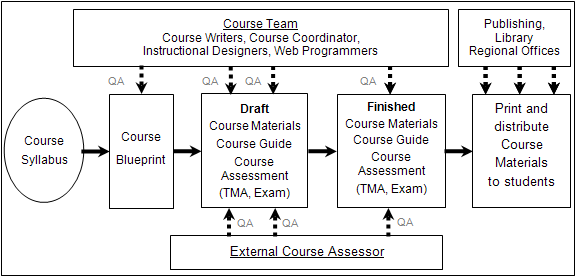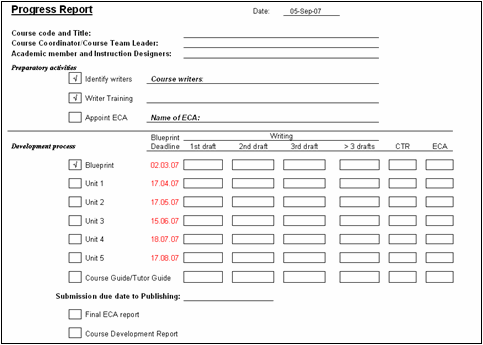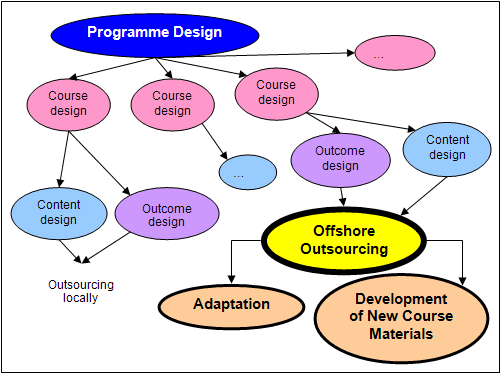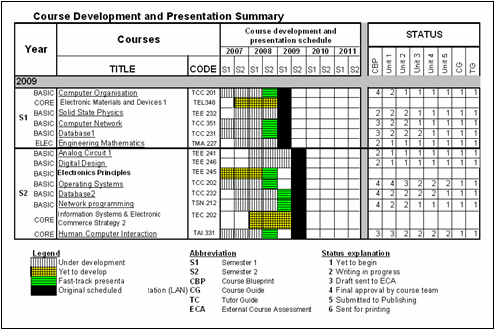Editor’s Note: Global competition requires higher quality at lower cost. Many industries have benefited by outsourcing and off-shoring various aspects of design and production. The publishing industry and education are no exception. Outsourcing requires close management to ensure high quality, contain costs, and keep projects on schedule. The editors are grateful to Dr. Wendy Bong for sharing her experience in this arena.
Monitoring Off-shore Outsourcing Projects
for Learning Resource Development
Bong Chin Wei
Malaysia
Abstract
In the world of “borderless education”, off-shore outsourcing of learning resources becomes the norm practised by universities worldwide, especially for a new start-up institution such as the Wawasan Open University (WOU). For the past 3 years of experience in learning resources development, the WOU has encountered various issues such as managing of writers in distant locations, meeting deadlines, training of writers in distant locations, keeping the cost down, copyright issues, quality control, and cultural differences/localisation of context. In overcoming some of these issues, the WOU has adopted an effective monitoring mechanism to enable success of this key activity in the university. Since its inception in 2006 until early 2008, the institution has successfully outsourced about fifty course materials off-shore and locally. This paper first introduces the outsourcing process in WOU followed by some of the issues faced by the university while working with the offshore writers and the adaptation of course materials. Subsequently, details of the monitoring mechanism used in the outsourcing process are explained. Lastly, this paper presents WOU’s future direction in this perspective.
Introduction
The Wawasan Open University (WOU) is Malaysia’s first charity-backed, private, not-for-profit Open University. It started to recruit students in 2007 with teaching and learning methodology that combines limited face-to-face instruction and computer-assisted instruction to maximise the student learning process. A self-contained learning resource in printed format is distributed to every student who enrolls in a course at the beginning of the semester. WOU currently has more than 2,000 active students.
In order to cope with the needs of business efficiency within a university for global competition, the WOU narrowed their field of business to so-called ‘core-business’. This is done by turning over activities performed internally in the university to an external party. The external party is paid to provide its services within a specific period of time. The term used to describe this service is outsourcing. At the WOU, there are two ways of off-shore outsourcing projects for learning resources development: 1) work with academic members from foreign institutions to develop new courses and 2) purchase rights to adapt existing course materials from other institutions. Two major reasons to promote off-shore outsourcing are 1) to gain access to world-class capabilities and 2) to access resources that are not easily found internally. The decision for outsourcing was planned carefully by the respective schools in the WOU.
The WOU requires developers for various study materials used by distance learners. With a limited number of faculty members and constraints of time, one of the ways to develop the study materials is by outsourcing off-shore and locally. Since its inception in 2006 until early 2008, the institution has successfully developed 48 course materials; twenty-one outsourced off-shore and twenty-seven outsourced locally.
This paper first introduces the outsourcing process in WOU. It explains the monitoring mechanism used for project development and some difficulties and issues faced by the university while working with off-shore developers and adaptation of study materials. Finally, this paper projects the future direction of the WOU in this perspective.
The Off-Shore Outsourcing Process
Currently, the university has three schools that are responsible for the design and development of individual programmes. In the WOU, a programme is a group to obtain a particular qualification. A course refers to a defined area of study for learners in a programme. For instance, the
Figure 1. General planning of outsourcing.
In each course, self-contained study material, sometimes referred as course material, comprises units to be covered in a course. Thus, a unit is a portion of the study material and they are broken into sub-topics or sections. In each course, a credit value will be assigned with a numerical symbol representing the number of hours a learner spends on a course during a semester. In the WOU, one course credit is equivalent to 40 hours of learning. The WOU’s course material comprises a course guide and printed material (divided into 5 units and sections) with self-tests (delivered via learning management system and limited face-to-face tutorial sessions).
After the content and learning outcomes have been designed by the schools, the consideration to outsource will take place. Referring to the bold circle in Figure 1, the two ways of off-shore outsourcing include working with academic members from foreign institutions to develop new courses (development of a new course) and the purchase of adaptation rights for existing course materials from other institutions (adaptation).
After the WOU has signed an agreement with the off-shore partner, a standard workflow is constructed as shown in Figure 2. One developer or a team of course developers is appointed to develop a particular course. A common pattern of cooperation is to go through a middle man or organisation that is responsible to find a team of experts to produce the course material. Another possible mode of cooperation is to interact directly with the course developer.

Figure 2. Workflow of the development of a new course.
In the process of developing a new course, course developers are required to produce a course blueprint based on the syllabus provided by WOU. In the course blueprint, the course design or structure is fixed with preliminary template or guidelines. A textbook and other reference sources are identified. In revision of the course blueprint, the WOU course team, led by a course team leader who is sometimes called the Course Coordinator (CC), contribute their expert knowledge wherever necessary. After the course blueprint has been finalised, the course developers start to write the units.
Units of study material will be revised several times based on the exchange of content knowledge between the content experts from the WOU’s internal course team and course developers. Instructional designers from WOU will ensure that the developed course material is consistent with WOU’s house style. In addition, an external input through a named external course assessor (ECA) is incorporated into the mechanism to ensure quality control in the overall development of the course.
In the case of a course adaptation, before the outsourcing process commences, WOU and the offshore partner have to negotiate and sign a license agreement where all terms and conditions including the royalty payment are agreed upon. With this agreement, the CC is given access to request and review course materials before the purchase of adaptation rights. The CC plays an important role in reviewing and assessing the suitability of the course material identified for adaptation. If a course material is appropriate and adheres to WOU syllabus, the Publishing Unit will purchase the rights from the offshore partner.
Following the purchase, the CC will source for a writer to adapt and localised the course material contents to learners’ requirements. The whole process of adaptation might take up to 6 months. The writer’s job scope includes providing new case studies, local examples, assignments, examination questions, and a course guide. The subsequent process of course development is similar to the work-flow depicted in Figure 2 except that the ECA report is provided by the outsourced institution.
For both purchasing of adaptation rights and development of new courses by foreign academic members, a license agreement needs to be drawn and agreed upon by the two working parties.
1. Agreement between WOU and the offshore partner for adaptation
As mentioned above, before the purchase of adaptation rights, WOU and the outsourced institution have to sign an agreement which describes the grant of reproduction and modification rights, royalty payment (amount and frequency), termination clause and intellectual property rights of the owner.
Adherence to the agreement is an important aspect of success of the collaboration. Mutual trust and frequent communication is important for the two parties to work successfully with each other.
2. Agreement between WOU and local writer or foreign institution
for development of new course
Agreement between a local writer and a foreign institution includes similar terms and conditions. The essential elements that determine accomplishment of the project are the timeline for course development, job specifications and resolution of copyright issues.
The writer is provided with a schedule or timeline to assist him/her to meet the deadline. An example of a course development timeline is presented in Table 1. The schedule assists the Course Coordinator in monitoring progress and enables the Course Coordinator to mediate and assist the writer if he/she has difficulty in fulfilling his/her commitment.
Table 1
Sample Course development timeline
Category of Work | Estimated | Commencement Date | First Draft Submission* | Final Draft Submission* |
Convert Course to Blueprint Develop Unit One (3-5 lessons) | Approx. 5-10 p. Approx. 60-80 p. | July 1, 2006 July 15, 2006 | July 10, 2006 Aug. 15, 2006 | July 15, 2006 Oct. 1, 2006 |
Develop Unit Two (3-5 lessons) Develop Unit Three (3-5 lessons) | Approx. 60-80 p. Approx. 60-80 p. | Aug. 15, 2006 Sep. 15, 2006 | Sep. 15, 2006 Oct. 14, 2006 | Nov. 1, 2006 Dec. 1, 2006 |
Develop Unit Four (3-5 lessons) Develop Unit Five (3-5 lessons) | Approx. 60-80 p Approx. 60-80 p. | Oct. 14, 2006 Nov. 15, 2006 | Nov. 15, 2006 Dec. 15, 2006 | Dec. 31, 2006 Feb. 1, 2007 |
Course Guide, Specimen Examination Paper, Answer Key and Marking Schemes, Assignment Files, PowerPoint Slides for each unit etc. | Approx. 50-100 p. | Dec. 15, 2006 | Jan. 15, 2007 | Mar. 1, 2007 |
Categories of works are listed clearly in the Annexure of the contract, which specifies the work relevant to the development of the course.
WOU respects and observes the Intellectual Property Rights of all individuals. As such, copyright is strictly observed in the University. The course developer is responsible and liable to identify and obtain all items that require copyright clearance. If the course developer is unable to obtain the copyright clearance, the university shall endeavour to seek clearances for such items identified. If copyright is unobtainable, these materials have to be omitted and replaced with others by the course developer.
Monitoring Mechanism
The monitoring mechanism used in the learning resources development is a crucial component in the success of the outsourcing project. From the start of the project, the WOU ensures that the developers have been trained in WOU house style (definition) as a one of the crucial preparatory activities. Besides that, an ECA will be identified so that he/she as an expert will grant the initial design of the course. The initial design of the course will be stated in the course blueprint.
In the course blueprint, the course team leader and the course developer collaborate to setup deadlines. Every unit will go through several revision processes involving WOU course team members. Submission of each unit is tracked by individual course as depicted in the progress report in Figure 3.

Figure 3: Sample progress report for individual course development.
Usually, a developer requires about one month to develop a unit. Revision takes longer as the course team needs to discuss issues such as the accuracy of content, design of instruction, presentation of the academic content, and compliance with the WOU’s house style. The course team will hold rigorous meetings in order to ensure the units have gone through a maximum internal quality assurance process. Information related to improvement of the unit is recorded in specific report, the Course Team Report (CTR).
Every single unit must be assessed by the ECA in terms of its organisation, flow and accuracy of the content. Checklists will be provided to the ECA in addition to interim reports on compatibility of course materials, relevance to course objectives, suitability for target student populations, and suggested changes in activities and assessment questions. The ECA will identify major strengths and weaknesses in the course materials and ensure whether the course materials are relevant in content, style and presentation, and functionality of case studies, activities, and references. More importantly, the ECA must evaluate and compare course materials with similar courses taught in ODL and/or traditional modes. In some cases, the ECA will recommend changes and revisions.
After the units have been completed, the course developers produce a course guide for students and tutor guide for tutors who facilitate the course in face-to-face tutorial sessions. These documents are reviewed by the ECA for quality assurance. A final report from the ECA indicates completion of the development process. The completed materials re sent to the in-house publishing department for editing and layout design. Before the learning materials are published, the course team leader must proof read the documents to ensure accuracy and consistency.
As the WOU is a new university, the development process is very active and the school needs to monitor the many stages of development of all courses. As a result, the course development and presentation summary is the key reference to ensure that the development is going smoothly and the material for subsequent presentation is ready on-time. As shown in Figure 4, the status column serves as an alert key for problematic courses that require special attention and may require remedial action. An example of problematic course development includes developers involved in plagiarism or who are not able to meet the deadlines. The alert system is also important to show the number of courses and when they are ready to be offered.
Figure 4. Sample monitoring chart for a list of courses in year 2009
under the School of Science and Technology.
A number of issues have been identified upon monitoring the learning resource development. Some of these issues were resolved; others were not.
Issues Related To Off-Shore Outsourcing
Similar to the definition used by Backman, Holmberg and Tonnby (2007), the success of the off-shore outsourcing project is defined by the benefits from outsourcing gained by the WOU as a result of deploying the outsourcing strategy. This can be measured by reduction in cost, satisfaction of learners, and perceived level of quality. Some issues that emerge in the process of off-shoring and outsourcing are highlighted as follows:
1. Copyright
One major problem encountered with foreign writers is infringement of Intellectual Property Rights (IPR), either intentionally or unintentionally. Surprisingly, some writers assume that information from websites is copyright free and can be used liberally.
There have been incidents where writers copied from textbooks or journals without citing references and giving credits where it is due. It is the WOU’s policy to acknowledge and respect IPR. Plagiarism is not allowed and must be avoided at all costs.
Under the Publishing Unit of WOU, there is a copyright page that serves as the gatekeeper to ensure that all course materials published by the university is free from copyright infringement. It is the university practice to write to all copyright owners to request permission and make payment to use the material when necessary. The materials will not be used if we failed to obtain consent from the owners.
2. Managing course developers in distant locations
Training of course developers is required, especially at the beginning of the outsourcing project. Understanding of WOU learners is important as it relates to the satisfaction of the target user of the course material. WOU imposes a set of house styles on the course materials and must ensure this style is fully understood by course developers and adaptors. Characteristics of a good course have to be defined at the very beginning and must be stated clearly ensure that developers meet WOU’s expectations. Sharing of methods used to design an effective course and its preferred language or assessment types are also important to course developers and adaptors.
Offshoring of university study material should be regarded as a dynamic process that evolves over time (Jesen and Pedersen, 2007). Therefore, bridging the gap between the two parties is extremely important. Universities that embark on an outsourcing strategy would do well to first establish a structured approach to close the gap that often exists between two parties. In the case of WOU, maintaining the relationship between WOU and course developers/adapters ensures success in collaboration. Nevertheless, the support team must be responsive in providing feedback that the other parties require. Communication between the two parties need to be predictable, interactive and proactive (Fuchs, 2007). WOU needs to appoint one or several members of a team for in-house and offshore locations to be responsible for communication exchange and to monitor the development of course materials. There must also be a person who is responsible for supporting and monitoring knowledge delivery process during the training process. This person will also be the main contact person for the off-shore team members and general queries will be dealt by this person.
3. Meeting deadlines
The average time for course development in WOU is between eight to twelve months. Any delay in submission of manuscript will affect the course presentation scheduled. Meeting the deadline of submission is crucial to the CC as there are still many level of preparations required before the course can be presented to the students. This includes several revisions from the in-house course team members and the ECA before the work is considered ready for publishing process.
As most of the course developers have other work, social and family commitments, they might not be able to meet the manuscript submission deadlines. Among the consequences are delay of course presentation, termination of writers and re-looking into the reserve pool for other writers. As a result, the university is burdened with additional cost and loss of time.
The importance of deadline is highlighted during the training and it is also explained in detail in the agreement. The role of the Course Coordinator as mediator is significant in monitoring the progress of the course developer. Ample reminder should be given if there is any delay from the very beginning.
4. Cultural differences/localisation of context
Due to the course developers’ backgrounds and cultural differences, the course materials developed require editing and amendments to suit Malaysian needs. The case studies used, examples given, and the language style, need to be changed and localised.
This is more apparent in developing business and management courses when foreign course developers do not understand our business and economic environment and hence, are not able to provide examples that students can comprehend.
The course team leader and team must put in extra effort to substitute facts and do their own research to complete course materials submitted by foreign course developers.
Future Direction
The WOU has a good track record in off-shore outsourcing with a moderate success rate. Off-shore outsourcing assists in fast-tracking the University’s course development and presentation and fills the gap when local expertise is not available. It also makes it possible for the schools to manage the development of a number of courses concurrently. Sharing of information and exchanging of ideas between academics from different background and experience is also a healthy trend in promoting intellectual knowledge.
We believe all the issues mentioned above could be resolved if more training is provided to the appointed course developers and ongoing communication channels are maintained between them and the appointed Course Coordinator. Mutual trust and respect of working procedures and ethics between faculty and developers facilitates discussion. Both parties need to make an effort to be tolerant in their requests and demands from each other. Off-shore outsourcing is not just a business transaction in a globalised world; it involves inculcating effective working relationships between two institutions.
The WOU as a new ODL institution will continue to outsource either locally or off-shore in meeting the demand of the fast changing intellectual environment. We will source for collaboration opportunities with different partners in fulfilling our future academic needs.
References
Backman, P., Holmberg, M and Tonnby, D (2007) ‘Key factors for successful offshore outsourcing projects’, School of Business Economics and Law, Sweden: Goteborg University.
Jesen, P. D. and Pedersen, T (2007) ‘Whether and what to offshore?, Center for Strategic Managmeent and Globalization, Denmark: Copenhagen Business School.
Chowdhary, R. (2008) Offshore Outsourcing Trends Available: http://EzineArticles.com/?expert=Rakhee_Chowdhary
Fuchs, G. (2007) Communication: The Holy Grail of Outsourcing. Available: http://www.cio.com/article/137952/Communication_The_Holy_Grail_of_Outsourcing
About the Author
Dr. Bong Chin Wei is Senior Lecturer in the School of Science and Technology at Wawasan Open University, Jalan Sultan Ahmad Shah, 10050 Penang, Malaysia Malaysia. She possesses a Masters and PhD in Information Technology (IT) from the Universiti Malaysia Sarawak (UNIMAS) with the Award of Postgraduate and Post-doctoral Fellowship from the Ministry of Science, Technology and Environment, Malaysia. In 10 years of academic experience, she has delivered computing and IT courses to graduates and undergraduates in private and public universities and colleges. She is actively involved in research and development in Artificial Intelligence, particularly in decision-making theory and fuzzy logic for different applications of optimisation. She has published a number of national and international conference and journal papers. She is IT consultant to a Computer Aided Design (CAD) solution firm, an external examiner for Penang Skill Development Centre (PSDC), and reviewer for several international journals and conferences.

